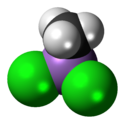Methyldichloroarsine
|
|
|||
| Names | |||
|---|---|---|---|
|
Preferred IUPAC name
Dichloromethylarsane
|
|||
|
Systematic IUPAC name
Dichloro(methyl)arsane
|
|||
| Identifiers | |||
|
3D model (Jmol)
|
|||
| Abbreviations | MD MDA |
||
| ChemSpider | |||
| MeSH | Methyldichloroarsine | ||
|
PubChem CID
|
|||
|
|||
|
|||
| Properties | |||
| CH3AsCl2 | |||
| Molar mass | 160.86 g·mol−1 | ||
| Appearance | Colorless liquid | ||
| Density | 1.836 g/cm3 | ||
| Melting point | −55 °C (−67 °F; 218 K) | ||
| Boiling point | 133 °C (271 °F; 406 K) | ||
| reacts | |||
| Hazards | |||
| Main hazards | Highly toxic, Irritant | ||
|
Except where otherwise noted, data are given for materials in their standard state (at 25 °C [77 °F], 100 kPa).
|
|||
|
|
|||
| Infobox references | |||
MDA
MDCA
Methyldichloroarsine, sometimes abbreviated "MD", is an organoarsenic compound with the formula CH3AsCl2. This colourless volatile liquid is a highly toxic vesicant that has been used in chemical warfare.
German chemists weaponized methyldichloroarsine during World War I, between 1917 and 1918. It was the first organoarsenic compound to be weaponized.
Focusing on the arsenic center, the molecule is pyramidal with the Cl-As-Cl and C-As-Cl angles approaching 90° (see image). Virtually all related arsenic(III) compounds adopt similar structures.
Methyldichloroarsine is produced by the reaction of methylmagnesium chloride and arsenic trichloride:
Typically such syntheses are conducted in ether or THF solutions and typically the product is isolated by distillation. Use of larger amounts of the magnesium reagent affords greater amounts of dimethylchloroarsine ((CH3)2AsCl) and trimethylarsine ((CH3)3As).
In World War I, the German manufacturing method consisted of a three-step reaction beginning with methylation of sodium arsenite:
followed by reduction of the disodium monomethylarsonate with sulfur dioxide:
subsequently reacting the monomethylarsine oxide thus formed with hydrogen chloride to yield methyldichloroarsine:
The As-Cl bonds in MD are susceptible toward nucleophilic attack. Reduction of MD with sodium metal affords the polymer [CH3As]n.
Methyldichloroarsine's only documented large-scale use is as a chemical weapon.
...
Wikipedia


